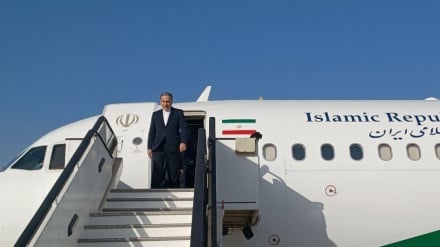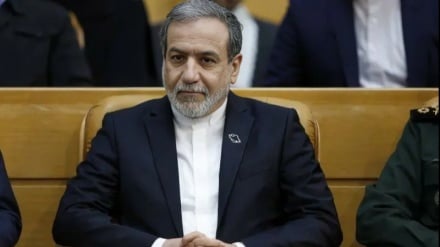Farewell O Messenger of Allah
Heartfelt condolences to you all on a day of grief. In fact, a day of double grief, since today is the doleful 28th of Safar, on which we mourn the end of the mission of Almighty’s Last Messenger to mankind as well as the martyrdom through poisoning of his elder grandson, exactly on the 39th anniversary of the grandfather’s departure from the mortal world.
The following is a feature on Prophet Mohammad (Blessings of God upon him and his progeny), whom God has hailed “Mercy unto the creation”.
“Allah, there is no god except Him, is the Living One, the All-Sustainer; He has sent down to you the Book with the truth confirming what was [revealed] before it, and He had sent down the Torah and the Evangel before as guidance for mankind, and He has sent down the Criterion – that is the Qur’an. Indeed those who defy the signs of Allah, there is a severe punishment for them; and Allah is All-mighty, Avenger.”
What you heard were ayahs 2, 3, and 4 of Surah Aal-e Imraan of the Holy Qur’an. As we said, we are commemorating the Great Day of Grief, when the Recipient of the Last and Final Scripture for the guidance of mankind, departed from the mortal world on completion of his 23-year mission.
Entrusted with the Furqan or the Criterion – that would stay forever after him to sift truth from falsehood – the Prophet of Islam, whose universal mission had been prophesied by all prophets of the past, including Moses the Recipient of the Torah and Jesus the Recipient of the Evangel, made sure that the Qur’an will never meet the sorrowful fate of the previous scriptures. In order to ensure the evergreen purity of his message, the Seal of Prophets not only stressed its memorization but emphasized in crystal clear words, time and again on the famous Hadith Thaqalayn, that would help preserve genuineness of Islam:
“I am leaving behind among you the Thaqalayn (Two Weighty Things); the Book of God (Qur’an) and my progeny, the Ahl al-Bayt. Hold fast to them and you will never go astray, since the two will never separate from each other, even when they return to me at the Pool (of Kowthar on Resurrection Day).”
It would be blasphemy to think Prophet Mohammad (blessings of God upon him and his progeny) was imposing his offspring on the Muslims, especially when it is God Himself Who has vouchsafed the spotless purity of his Ahl al-Bayt or Blessed Household, in ayah 33 of Surah Ahzaab, which reads:
“Allah desires to keep away uncleanness from you Ahl al-Bayt, and preserve you thoroughly purified.”
The words of the Almighty Creator are self-explanatory. It means that in order to have a proper and correct understanding of the Book of God, the Ummah needs practical guides, who ought to be Divinely-Ordained and to whom the Qur’an has referred as “Rasekhouna fi Ilm” or Repositories of Knowledge. For this reason, the Prophet did not suffice on merely repeating this Divinely-inspired statement which was recorded by scribes and is found in the texts of all denominations of Islam. He was also not content with the historic proclamation he had made at Ghadeer-Khom on God’s express commandment, following revelation of ayah 67 of Surah Ma’edah, while returning from his farewell Hajj, when he lifted his dear cousin and son-in-law in front of a huge gathering of 120,000, with the words: “For whomsoever I am Master, this Ali is his Master.”
Thus, on the command of the Creator took special care that the Qur’an is not left inactive merely between two covers. There was the witness who testified to his divine mission before stupefied Arabs and this same person was actually the sole witness to the taking shape of the Holy Qur’an throughout those 23 years. This was none other than Imam Ali ibn Abi Taleb (AS), who as a ten-year lad was present on Mount Noor that day when the Archangel had brought the first revelation from God Almighty. He would be present when the Prophet would depart from this world, never having left his mentor alone throughout the formative years of Islam. Imam Ali (AS), whose position was likened to the Holy Qur’an or the Speaking Qur’an (Qur’an an-Nateq) by the Prophet used to say that he knows when and where each single verse of the Holy Qur’an was revealed to the Prophet. It is here we understand the importance of Hadith ath-Thaqalayn and the Prophet’s command that the ummah will never go astray as long as it holds fast to Revealed Words of God and his own progeny the Ahl al-Bayt.
Prophet Mohammad (blessings of God upon him and his progeny) knew that like the Israelites, who had ignored the instructions of Prophet Moses to follow Aaron while he was on Mount Sinai, some of his own prominent companions would conveniently forget the pledge of allegiance they had made to Imam Ali (AS) as vicegerent.
Wasn’t Judas Iscariot, who tried to betray Jesus to the Romans, a disciple of the Messiah – whose monotheistic message was distorted beyond recognition by another contemporary, Paul, the Hellenized Jew?
In view of these facts, during his last days the Prophet called for ink and paper to write down his will so that Muslims will never splinter into sects after him. Alas, he was prevented from doing so by one of his companions, who dared to question the Prophet’s mental faculties, in violation of God’s words in the Qur’an that the Prophet neither errs nor goes astray and whatever he says is revelation revealed – as is evident by ayahs 3-to-5 of Surah Najm.
Irrespective of the fact that the virgin-born Messiah never claimed to be godhead, on closer scrutiny of the Gospels we find that his mission was limited to the Children of Israel, as St, Luke quotes him verse 24, chapter 15, as saying: “I have not been sent but to the lost sheep of Israel”.
In contrast God Almighty says in ayah 107 of Surah Anbiya of the holy Qur’an:
“We have not sent you but as Mercy unto the creation.”
Thus, the universal mission of Islam needs heavenly leaders, after the end of the mission of the Last and Greatest of God’s Messengers, in order to guide people towards the straight and unwavering path that leads to paradise.
It was for this reason the Prophet had hailed his grandsons as: “Hasan and Husain are the Leaders of the Youth of Paradise”.
Now we understand the meaning and purport of the Hadith Thaqalayn that stresses the inseparability between the Ahl al-Bayt and the Qur’an.
To sum up, we present Sermon 27 of the famous book Nahj al-Balagha, where Imam Ali (AS) emphasizes the significance of the Ahl al-Bayt in Sermon 97, after the passing away of the Prophet:
“Look towards the members of the Prophet's family. Adhere to their direction. Follow their footsteps because they would never let you out of guidance, and never throw you into destruction. If they sit down, you sit down, and if they rise up you rise up. Do not go ahead of them, as you would thereby go astray and do not lag behind of them as you would thereby be ruined.”
AS/ME


